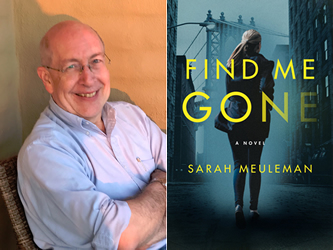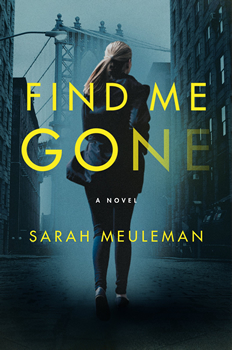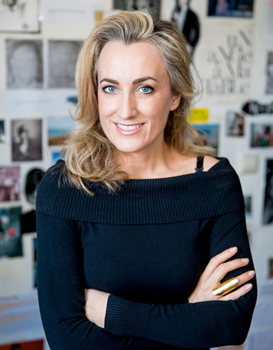

Neil Nyren’s Spotlight: Sarah Meuleman
An Unusual Journey of Bringing
Art to Life
 FIND ME GONE is an unusual novel in many respects — its story, its author, and the creation of the book itself.
FIND ME GONE is an unusual novel in many respects — its story, its author, and the creation of the book itself.
Belgian author Sarah Meuleman says it is the sum of everything she has been and done in her life: a singer-songwriter, a journalist, a television host, a writer, and managing editor at Vogue magazine.
“I used to sing [her album More Than Meets the I, under the name SAM, was released in 2003], and sound is pivotal to me: how sentences flow, rumble, and roll,” she says. “My background in journalism strengthens me in weaving the story, and the acting and presenting helps tremendously with writing dialogue. I feel that each sidestep I’ve ever made has added significantly to the thing I love doing most: writing.”
But even with the writing, she has continued to take sidesteps.
The history of FIND ME GONE is a case in point. It was first published in Belgium in 2015, and received praise and an awards nomination, but then the next year, she “remixed” the book and published a new version of it with a different title. Why did she do that and what version are we reading now?
“This is an important point for me,” she says. “Look at art these days: it’s very much alive. Songs are being mixed and remixed, works of art constantly evolve, a play is never the same on the last performance as it is on opening night. I think this dynamic is at the heart of what art is about. But when I look at literature, I don’t see that dynamic. When a writer delivers her novel, the work is usually done. The book is printed, shelved, and will remain the same forever. But you can tell every story in so many different ways; we do it all the time when we share stories with friends. Not one version is the same, so why would books be obliged to freeze in time?
“By ‘remixing’ my novel, I wanted to call for more playfulness and dynamics in contemporary literature. When my book went into a second printing, I decided not to tell a different story, but to tell the same story slightly differently. It’s not a completely new idea, of course. Vladimir Nabokov always kept changing and tweaking his novels. He said, ‘My pencils will outlast their erasers.’

“FIND ME GONE is in fact the third version of this story. I combined the two earlier versions and added new chapters in English. This is not simply a translation – I have reworked the novel – and for me, the English version is the ultimate one. For now.”
The novel itself is haunting, emotional, a story filled with secrets. In a small Belgian town in 1996, two twelve-year-old girls, Hannah and Sophie, are inseparable, all the more so because that summer, girls start disappearing. And then it is Sophie’s turn. After a school dance, she fails to return home, and is never seen again.
Eighteen years later, Hannah is living in New York City, a successful columnist for a fashion magazine, but restless, adrift, and still obsessed with disappearances. Fed up with writing about the “It girls and the perfect parties,” she quits her job to write a book about three women who fascinate her, all writers, all who vanished: Agatha Christie, who went missing for 11 days in 1926 at the height of her success, and never spoke about it to anyone; Barbara Newhall Follett, an American prodigy whose novels at the ages of 12 and 14 became sensations, but who, at 25, left her house in Brookline, Massachusetts, one day and was never seen again; and Virginia Woolf, 59, filling her pockets with stones and walking into the river.
“Talented, wise women who raised their voices and then suddenly became silent. Why?” Hannah wonders. But the things she ends up exploring, the things she discovers, force her to confront the questions and memories she has suppressed for so long.
 What happened to Sophie? The answer will come as a shock. Whatever you think is the truth – you’re wrong.
What happened to Sophie? The answer will come as a shock. Whatever you think is the truth – you’re wrong.
As Hannah pursues the research, her three subjects themselves, as seen through Hannah’s eyes, become living characters in the story. How did the author become interested in these women? Did she herself feel a special kinship?
“As a child, I used to read everything there was in the house, and when I had finished reading all my books, I used to sneak into my parents’ bedroom to steal books from their shelves. My mother loved Agatha Christie. My father is an avid Stephen King fan. I must have been ten when I read their books. Later, I was completely mesmerized by Virginia Woolf, her writing and her person. When I discovered Barbara Follett, she inspired me: so very young and talented, completely in love with words.
“I noticed that I mirror myself in the writers I love, comparing their ways, habits, stories to mine, often using them as an inspiration. But then I thought: who am I to presume I know anything about them? Am I not simply reducing these great women to ‘flat characters’ sticking their lives onto mine, as Hannah describes it in FIND ME GONE: ‘click, drag, drop?’
“I decided to use this fascination in my novel; this tender line between ‘real’ authors and how my main character Hannah draws on them to solve the mystery of her best friend Sophie.”
Meuleman also learned a bit about the writing processes of the three women, and these exerted their own influence on her, even while she crafted her own.
“Agatha used to talk to herself and tell herself stories out loud during long walks on the English moors. In my case, it’s a little more prosaic. I usually sit somewhere in the back of a café with a cappuccino and quietly mumble the lines of a scene behind a laptop,” she says.
“I’m tremendously inspired by music. I love to write scenes with my headphones on, choosing a specific track to accompany the scene and then playing it on repeat. I can listen to one particular song again and again and again, for an hour or as much as it takes to get the scene finished. It’s a dreamlike state.
“As for the story of Hannah and Sophie itself, it was there before I started writing it down. I love creating tension and twists, but a truly suspenseful novel with a believable yet unexpected twist demands a lot of plotting and discipline. Suspense is such a delicate balance. You continuously need to ‘see’ the story through the eyes of your reader — where do you leave her guessing, where do you plant a clue?”
The creation of that writing process even extended to the chapter titles of her novel, all of which are titles of movies, songs, or books.
“I wanted them to be more than just informative ‘road signs’ in the novel,” she says. “I wanted the words to convey a certain mood in just a few words, and what better to use than titles of familiar movies and songs? When I say to you ‘Candle in the Wind,’ these four words tell you so much more and convey more meaning and feelings than perhaps ten pages of text could.”
How much of Hannah and Sophie are in Meuleman herself?
“I was born in a seaside town in Belgium and lived in a village close to Bachte-Maria-Leerne, where FIND ME GONE is partly set. Just like Hannah and Sophie, I attended a girls’ school and was taught by nuns, which must make it sound like I’m seventy years old. In fact, in Belgium, tradition is important and the tradition of girls’ schools and uniforms lasted for a very long time. I walked around in a dark green uniform for eleven years and I guess that’s the reason I still don’t wear green to this day.”
What about the fashion magazine Hannah quits in disgust? Has Meuleman herself felt that way? Another sidestep.
“Let’s just say that as a Vogue journalist, I’ve been granted a look behind the scenes,” she says. “I’ve marveled at the glamour and the beauty of the rich and famous, but have also glimpsed the much more ambiguous world underneath.”
 That doesn’t mean that Meuleman shies away from personal topics. Her regular column in Vogue, “Some Like It Hot,” tackles every kind of gender issue — sex, equality, infidelity, body issues, falling for the wrong man, being “the other woman” — often illuminated by very intimate stories of her own. That was difficult to do at first.
That doesn’t mean that Meuleman shies away from personal topics. Her regular column in Vogue, “Some Like It Hot,” tackles every kind of gender issue — sex, equality, infidelity, body issues, falling for the wrong man, being “the other woman” — often illuminated by very intimate stories of her own. That was difficult to do at first.
“I struggled with the column because the subject matter was incredibly personal,” she says. “But soon it proved to be the perfect format for me to talk about gender topics in a playful and open way. And the response was very positive; one of the perks of social media is that you can actually see how people share the story and continue the conversation about a topic you introduced or a question you raised.”
It’s a perk she sees, too, in the television show she created, Sarah’s Savages.
“It’s an art show that focuses not only on the work of art, but also on the artist,” she says. “I traveled from India to France to America and many other countries, where I was welcomed by the artists in their homes and their families. With this show, we wanted to break the barriers people sometimes feel when they think of modern art. Art is not hard or complicated! It’s the work of a person, using her imagination to create something beautiful or meaningful. And I’ve met so many beautiful and inspiring people during the show.”
That sentiment extends to the people she’s met along the way in publishing.
“I think the success of every new author starts with someone believing in you,” she says. “Writing may be an activity you do alone, and, yes, it can be really lonely sometimes, but getting a book ‘out there’ is something you do as a team. I’ve been very fortunate that my literary agent Cecile Barendsma of Cecile B Literary Agency ‘discovered’ the book and recognized its potential. And then my editor Laura Brown of HarperCollins signed the book, and FIND ME GONE’s journey began. I worked closely with Laura on the English version, and now the wonderful and resourceful team of Harper Perennial is launching the book.
“It can be really daunting as a new author to get your debut novel out there, especially when you’re from a tiny country like Belgium. But, so far, the response has been incredible.”
Her next book is also a suspense novel, set this time on a mysterious group of islands. As with FIND ME GONE, it’s structured in brief, fast-paced chapters, “and it will have twists and an edge, but that’s all I can tell you now!”
One thing seems certain, though. No matter what steps, or sidesteps, she takes, this is one writer who will not disappear.
*****
Sarah Meuleman is a Belgian author and journalist. In 2015 she published her first novel The Six Lives of Sophie, which received much critical praise in the media and was nominated for the Bronzen Uil, for best literary debut of 2015.
In the beginning of 2016 however, she ‘remixed’ her debut novel and presented a new version with the title Wat ik je niet vertel which, again, received much critical acclaim.
On October 23rd 2018, Find Me Gone, Sarah Meuleman’s English debut novel, will be published by Harper US and Canada. In January 2019 FIND ME GONE will be launched in the UK. Surf to the homepage for the early (starred) reviews.
Sarah is an accomplished moderator and interviewer. She was co-creator and host of the television show Sarah’s Savages. Sarah is a Vogue columnist and has written many interviews with international artists, politicians and celebrities. She studied Germanic Philology (University of Ghent) and Literature (University of Amsterdam, cum laude). Sarah speaks Dutch, English, French and German.
To learn more about Sarah and her work, please visit her website.
Neil Nyren retired at the end of 2017 as the Executive VP, associate publisher and editor in chief of G. P. Putnam’s Sons. He is the winner of the 2017 Ellery Queen Award from the Mystery Writers of America. Among his authors of crime and suspense were Clive Cussler, Ken Follett, C. J. Box, John Sandford, Robert Crais, Jack Higgins, W. E. B. Griffin, Frederick Forsyth, Randy Wayne White, Alex Berenson, Ace Atkins, and Carol O’Connell. He also worked with such writers as Tom Clancy, Patricia Cornwell, Daniel Silva, Martha Grimes, Ed McBain, Carl Hiaasen, and Jonathan Kellerman.
He is currently writing a monthly publishing column for the MWA newsletter The Third Degree, as well as a regular ITW-sponsored series on debut thriller authors for BookTrib.com, and is an editor at large for CrimeReads.
This column originally ran on Booktrib, where writers and readers meet:
- ITW Presents: The Breakout Series - April 25, 2024
- The Big Thrill Recommends: THE GARDEN GIRLS by Jessica R. Patch - April 25, 2024
- The Big Thrill Recommends: AN INCONVENIENT WIFE by Karen E. Olson - April 25, 2024


